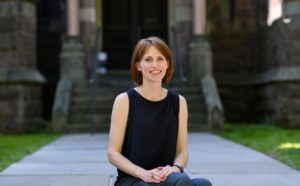“Music is the noisiest, most ungainly, least articulate branch of the humanities, and I thoroughly enjoy being a humanist in that vein.”
I study the intellectual, aesthetic, and political history of medieval music, and the intersections between musical texts, material culture, and political life in the late-medieval Mediterranean. My writing has appeared in The Journal of Musicology, New Medieval Literatures, and Plainsong and Medieval Music.
My first book, Music and the Making of Medieval Venice (Cambridge University Press, 2023) focuses on a set of musical projects that gave form to Venetian history and framed and interpreted the unique material culture of the city as it was in the process of taking shape. Showing the state’s earliest musical endeavors bound up with legal culture, stemming from projects of historiography, or situated within the rich material environment of relics and reliquaries, mosaics and wall paintings, icons and statues, the book theorizes the relationship between dramatic and political forms of representation in Venice’s late-medieval empire in the eastern Mediterranean, and engages enduring questions about music’s relationship to social and symbolic forms, language, religion, and the natural world, arguing for the ways music can be both a metaphor for and constitutive of political life.
My newest project, Pulse of the Voice: Song, Human Semblance, and Signs of Life in the Middle Ages, explores the pervasive role of song in figuring the human and theorizing its representation from the early Middle Ages to its end. It uncovers new sites of musical discourse in medieval image theory and civic ritual, in the workings of automata, marvels, and miracles, and in liturgical drama and anatomical theaters.
Other projects-in-progress revolve around musical fragments, bells, relics, and earthquakes, and Josquin des Prez.
At Princeton, I teach courses on the history of choral music; musical paleography and notation; music and art; music and fiction; music in the global Middle Ages; medieval music drama; music and the environment; Hildegard of Bingen; the twelfth century; and trecento song. Approaching historical and theoretical questions through musical performance and practice is a method of thinking and teaching that I especially enjoy. To this end, my colleague Beatrice Kitzinger and I co-founded LUDUS, an interdisciplinary working group devoted to the study of the Middle Ages in its live, plastic, and time-bound dimensions, through which we regularly host scholars, performers, and practitioners of a wide variety of historical artforms.
I am an associated faculty member at the Seeger Center for Hellenic Studies and in the Program of Medieval Studies. From 2019–2022 I was Elias Boudinot Bicentennial Preceptor. Before coming to Princeton, I taught at Stanford University as a Mellon Fellow in the Humanities.
B.A. Dickinson College; M.A. Princeton University; Ph.D. Princeton University
Fellowships and grants from the Andrew W. Mellon Foundation
American Council of Learned Societies
Fulbright Foundation in Greece
Medieval Academy of America
Gladys Krieble Delmas Foundation
Monograph
Music and the Making of Medieval Venice. Cambridge University Press (Music in Context). 2023.
Journal Articles
“A Voice in the Cow Stall: Aesthetic Creatures of the Renaissance.” Modern Philology 122:4 (2025): 460-82.
“Open Form and Canonic Matter in Trecento Song.” New Medieval Literatures 19 (2019): 121–150.
“Cantus figuratus and Monastic Re-Figuration in the Late-Medieval Veneto.” Plainsong & Medieval Music 28:1 (2019): 42–75.
“Voicing the Doge’s Sacred Image.” Journal of Musicology 32:2(2015): 198–245.
Courses
- MUS 528: Seminar in Musicology: Digital Musicology
- MUS 243: Music in the Mediterranean
- MUS 338: Music in the Global Middle Ages
- MUS 221: History of Western Choral Music
- MUS 338: Music in the Global Middle Ages
- MUS 221: History of Western Choral Music
- MUS 221: History of Western Choral Music
- MUS 527: Seminar in Musicology: Music of the Twelfth-Century Renaissance
- MUS 334: Venice, Theater of the World
- MUS 270: Medieval and Renaissance Music from Original Notation
- MUS 343: Music through Fiction

